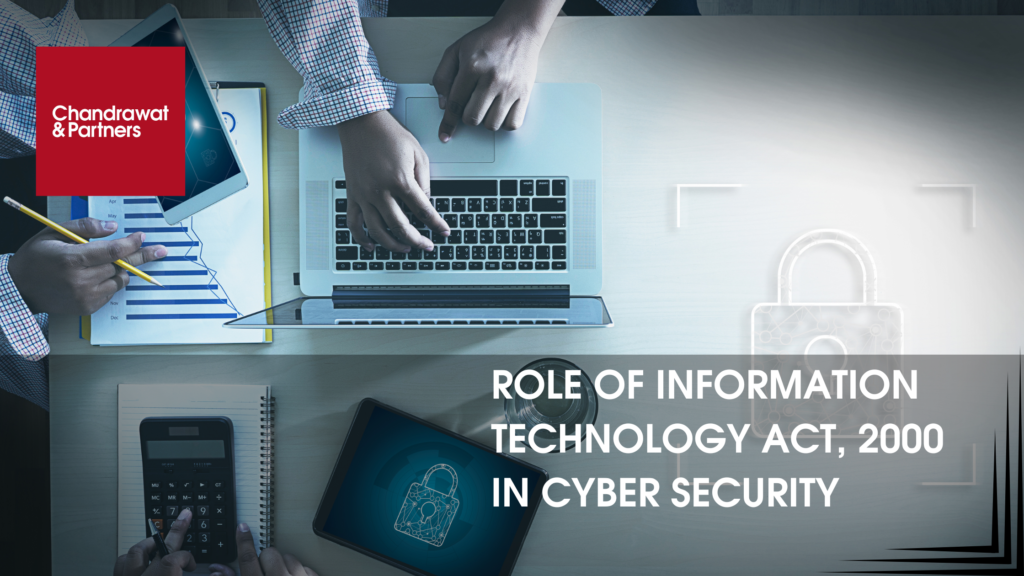Share :
ROLE OF INFORMATION TECHNOLOGY ACT, 2000 IN CYBER SECURITY
Cyber security is the practice of protecting computers, servers, mobile devices, electronic systems, networks, and data from malicious attacks. Technology is used in crimes to commit fraud, identity theft, data breaches, computer viruses, frauds, and other malevolent deeds. Such infractions may impact people, institutions, and even governments. Cybercrime is the broad spectrum of illegal behaviors that involve the use of digital equipment and/or networks.
TYPES OF CYBERCRIME
Here are the most common types of crimes relating to cybersecurity:
Hacking: It is the act of gaining unauthorized access to a network or computer system. Hackers may introduce viruses, cause disruptions to operations, or steal data.
Phishing: It is a kind of social engineering assault where the intention is to fool victims by disclosing private information like credit card numbers, usernames, or passwords.
Identity Theft: It is the fraudulent use of another person’s name, Social Security number, or credit card number for one’s own fraudulent gain.
Cyberstalking: It is the practice of pursuing a target through electronic messaging. Cyberstalkers may follow their victim’s actions both online and offline, or they may send them intimidating or harassing communications.
LEGISLATION AND REGULATIONS
India has several cybersecurity regulations and laws in place to address cybercrime. IT Act, 2000 act as the pillar for cybersecurity in India. There are complex web of legislation, regulation and policies. It includes, The Digital Personal Data Protection Act, 2023 (“DPDPA”), Information Technology Rules, National Cyber Security Policy (“2013”), National Cyber Security Strategy (“2020”). Certain sectors like finance and healthcare might have their own cybersecurity regulations to address specific risks and vulnerabilities.
- Information Technology Act, 2000: This act has been formulated by Indian Parliament primarily for the matters related to Cybercrime and e-commerce.
- Amendments to the IT Act: Over the years, the IT Act has been amended to keep up with technological advancements and address emerging cyber threats.
- Data Protection Laws: India is in the process of implementing comprehensive data protection legislation to safeguard personal data and privacy.
- National Cyber Security Policy: The government has formulated policies to enhance
cybersecurity infrastructure, promote research, and create awareness.
COUNTERING THE IMPACT OF FRIVOLOUS LITIGATION
This landmark judgment by the Supreme Court holds significant implications for the broader issue of misusing legal provisions to settle personal scores or harass individuals. By imposing a substantial cost on the errant party, the Court has sent a strong message that such practices will not be tolerated and will attract severe consequences.
The ruling also underscores the need for responsible behaviour from individuals, especially those holding positions of authority. In this case, the Court noted that the wife and her father had misused their official positions to lodge complaints against the appellant, subjecting him to trials at multiple locations.
Furthermore, the judgment highlights the importance of judicial scrutiny and due diligence on the part of law enforcement agencies and courts. The High Court and the Rajasthan Police were criticized for failing to thoroughly examine the complaint and identify the prior acquittal of the accused in a similar case.
INFORMATION TECHNOLOGY (“IT”) ACT, 2000
This act provides legal recognition for electronic transactions, digital signatures, and electronic records. It also defines offences related to computer systems, data breaches, and cyber fraud. By recognizing digital signatures and electronic records, it offers a legal basis for electronic government. The Act outlines what constitutes a cybercrime and how it is punished. The Act facilitates electronic communication and storage channels as well as the electronic filing of papers with government bodies.
Legal Recognition of Digital Signatures and Electronic Records: The Act gives digital signatures and electronic records legal standing, which is important for safe online transactions and record-keeping. This lessens need on paper documents and encourages trust in online shopping.
Penalties of Cybercrimes: Hacking, data theft, and illegal access to computer systems are only a few of the offenses listed under the IT Act. It establishes punishments for certain transgressions, discouraging offenders and giving victims legal options.
Guidelines for Intermediaries: The Act establishes rules for social media sites and internet service providers (“ISPs”). These rules support law enforcement in fighting cybercrime by eliminating illegal content and saving data for investigations
Data Security Measures: The IT Act gives the government the authority to establish regulations on data security procedures, even though it does not specifically list data security measures. This lays the groundwork for upcoming laws and recommended data protection procedures.
SHREYA SINGHAL VS. UNION OF INDIA CASE
The case of Shreya Singhal vs. Union of India is a landmark decision in India concerning free speech and online expression. Section 66A of the Technology Act of 2000 makes it an unlawful act to communicate “grossly offensive” or “menacing” content online. In 2015, the Supreme Court gave the decision to struck down Section 66A as unconstitutional. The Court also found that Section 66A was not a “reasonable restriction” on free speech under Article 19(2) of the Constitution. The Shreya Singhal judgement is a significant victory for free speech in India. It protects online expression from arbitrary restrictions and ensures a more open and vibrant online space.
HOW WE CAN HELP?
- Our experts aim at protecting client’s data. Data can include financial records, intellectual property, and personal details. A cyberattack could expose this data, leading to identity theft, financial loss, and reputational damage for the firm.
- Our team aims at maintaining the client’s trust. Our client entrusts us with their sensitive information, expect it to be safe.
- Many industries have regulations around data security. Cybersecurity measures help ensure compliance. We comply with the regulations and legislations relevant to cybersecurity.
For more information or queries, please email us at
[email protected]





